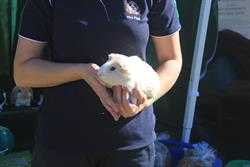Professional Development Animal Course
If you already know your discipline and industry, you have a head start on being a successful animal care specialist. This course is designed to "top up" the skills you already have; giving you expanded skills you can offer employers or clients; and new ways of applying the knowledge you already have in an industry you already know.
Add training or health concepts and practical skills to your existing skills, to broaden business opportunities or attractiveness to employers. You don't need to commit to a degree to be an Animal Care Professional Many Animal Care professionals are in fact not qualified at all Success in Animal Care comes by having up to date, usable skills; good networking (contacts with industry) and being sensitive to the needs of owners and their pets.
Proficiency Award? a type of “specialist” certificate; a way of topping up an existing degree or diploma with professional training that gives your employablilty a quantum leap forward; designed to provide a qualification to reflect “knowledge or skills” in a specialised area.
Modules
Note that each module in the Qualification - Proficiency Award in Animal Care is a short course in its own right, and may be studied separately.
Working With Animals
 Animal care industries fall into three broad categories:
Animal care industries fall into three broad categories:
- Farm Animals
- Pets
- Wildlife
These areas of work can often overlap, and require similar skills and knowledge. Opportunities you will find can change over time, and may be different in some countries to others. For example:
- In wealthy countries where there is a lot of disposable income, there can also be a lot of money spent on pets; for example the cost of caring for a dog over the course of its life in Australia can be more than half the annual income of an individual.
- In some countries, wildlife tourism may be a significant contributor to the country’s economy, and this will provide a significant motivation for jobs to be created in wildlife conservation.
- Some countries that have economies dependent heavily on agriculture, will offer more work with farm animals than with pets or wildlife.
Getting Started
Many people begin their careers by getting involved with animals at an early age; perhaps as pets, or farm animals if they live on a farm or small holding. Some people undertake a course, or volunteer at an animal shelter, or zoo. Any and all of these things are good starting points.
You should remember that in today's world, a course of study by itself is never a guarantee of a career. Plenty of people complete degrees in biology, agriculture or marine studies, and never work with animals; while others get involved, gain experience, and study all at the same time.
Developing a career involves working on many pieces of the puzzle all at the same time.
Employers will engage your services if you can do the job, not just because you have the qualifications.
You need to work on developing experience, knowledge, networking, communication skills, attitude, learning to work to specification, and more,
Our courses are cussed on helping you with all of these things.
__________________________________________________________________________________________
WHY CHOOSE US?
• Reputation and Experience: using I.T. for all courses since 1982, on the internet since 1992, teaching courses online since 1995, developing our own software with in house progammers since 1998
• Industry focus: courses designed to suit industry needs and expectations
• Different focus: develop problem solving skills that make you stand out from others
• Hands on: develop practical as well as theoretical skills
• Lots of help: dedicated and knowledgeable tutors.
• Efficient: prompt responses to your questions
• Reliable: established in 1979, independent school with a solid history
• Up to date: courses under constant review
• Resources: huge wealth of constantly developing intellectual property
• Value: courses compare very favourably on a cost per study hour basis
• Student amenities: online student room, bookshop, ebooks, acs garden online resources.
